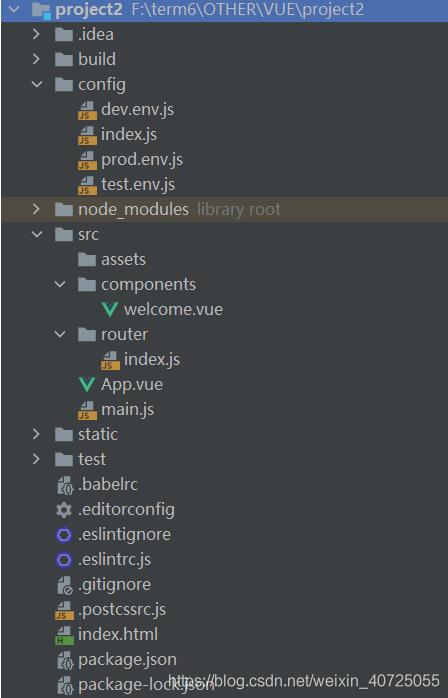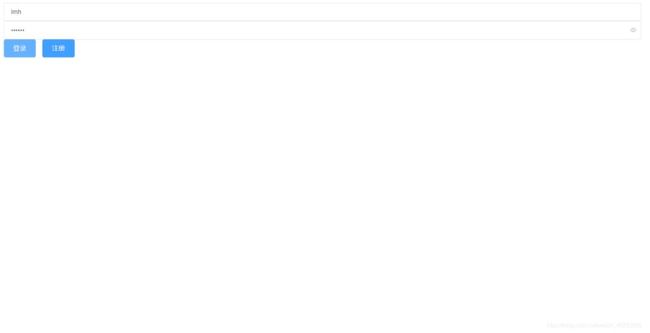本文实例为大家分享了springboot+VUE实现登录注册的具体代码,供大家参考,具体内容如下
一、springBoot
创建springBoot项目
分为三个包,分别为controller,service, dao以及resource目录下的xml文件。
UserController.java
package springbootmybatis.controller;
import org.springframework.web.bind.annotation.CrossOrigin;
import org.springframework.web.bind.annotation.PostMapping;
import org.springframework.web.bind.annotation.RequestBody;
import org.springframework.web.bind.annotation.RestController;
import springbootmybatis.pojo.User;
import springbootmybatis.service.UserService;
import javax.annotation.Resource;
@RestController
public class UserController {
@Resource
UserService userService;
@PostMapping("/register/")
@CrossOrigin("*")
String register(@RequestBody User user) {
System.out.println("有人请求注册!");
int res = userService.register(user.getAccount(), user.getPassword());
if(res==1) {
return "注册成功";
} else {
return "注册失败";
}
}
@PostMapping("/login/")
@CrossOrigin("*")
String login(@RequestBody User user) {
int res = userService.login(user.getAccount(), user.getPassword());
if(res==1) {
return "登录成功";
} else {
return "登录失败";
}
}
}
UserService.java
package springbootmybatis.service;
import org.springframework.stereotype.Service;
import springbootmybatis.dao.UserMapper;
import javax.annotation.Resource;
@Service
public class UserService {
@Resource
UserMapper userMapper;
public int register(String account, String password) {
return userMapper.register(account, password);
}
public int login(String account, String password) {
return userMapper.login(account, password);
}
}
User.java (我安装了lombok插件)
package springbootmybatis.pojo;
import lombok.Data;
@Data
public class User {
private String account;
private String password;
}
UserMapper.java
package springbootmybatis.dao;
import org.apache.ibatis.annotations.Mapper;
@Mapper
public interface UserMapper {
int register(String account, String password);
int login(String account, String password);
}
UserMapper.xml
insert into User (account, password) values (#{account}, #{password});
主干配置
application.yaml
server.port: 8000
spring:
datasource:
username: root
password: 123456
url: jdbc:mysql://localhost:3306/community?serverTimezone=UTC&useUnicode=true&characterEncoding=utf-8
driver-class-name: com.mysql.cj.jdbc.Driver
mybatis:
type-aliases-package: springbootmybatis.pojo
mapper-locations: classpath:mybatis/mapper/*.xml
configuration:
map-underscore-to-camel-case: true
数据库需要建相应得到表
CREATE TABLE `user` ( `account` varchar(255) COLLATE utf8_bin DEFAULT NULL, `password` varchar(255) COLLATE utf8_bin DEFAULT NULL ) ENGINE=InnoDB DEFAULT CHARSET=utf8 COLLATE=utf8_bin;
二、创建VUE项目
安装node,npm,配置环境变量。
配置cnpm仓库,下载的时候可以快一些。
npm i -g cnpm --registry=https://registry.npm.taobao.org
安装VUE
npm i -g vue-cli
初始化包结构
vue init webpack project
启动项目
# 进入项目目录 cd vue-01 # 编译 npm install # 启动 npm run dev
修改项目文件,按照如下结构
APP.vue
welcome.vue
登录 注册
main.js
// The Vue build version to load with the `import` command
// (runtime-only or standalone) has been set in webpack.base.conf with an alias.
import Vue from 'vue'
import App from './App'
import router from './router'
import ElementUI from 'element-ui'
import 'element-ui/lib/theme-chalk/index.css'
import axios from 'axios'
import VueAxios from 'vue-axios'
Vue.use(VueAxios, axios)
Vue.use(ElementUI)
Vue.config.productionTip = false
/* eslint-disable no-new */
new Vue({
el: '#app',
router,
components: {App},
template: '
router/index.js
import Vue from 'vue'
import Router from 'vue-router'
import welcome from '@/components/welcome'
Vue.use(Router)
export default new Router({
routes: [
{
path: '/',
name: 'welcome',
component: welcome
}
]
})
config/index.js
'use strict'
// Template version: 1.3.1
// see http://vuejs-templates.github.io/webpack for documentation.
const path = require('path')
module.exports = {
dev: {
// Paths
assetsSubDirectory: 'static',
assetsPublicPath: '/',
proxyTable: {
'/api': {
target: 'http://localhost:8000', // 后端接口的域名
// secure: false, // 如果是https接口,需要配置这个参数
changeOrigin: true, // 如果接口跨域,需要进行这个参数配置
pathRewrite: {
'^/api': '' //路径重写,当你的url带有api字段时如/api/v1/tenant,
//可以将路径重写为与规则一样的名称,即你在开发时省去了再添加api的操作
}
}
},
// Various Dev Server settings
host: 'localhost', // can be overwritten by process.env.HOST
port: 8080, // can be overwritten by process.env.PORT, if port is in use, a free one will be determined
autoOpenBrowser: false,
errorOverlay: true,
notifyOnErrors: true,
poll: false, // https://webpack.js.org/configuration/dev-server/#devserver-watchoptions-
// Use Eslint Loader?
// If true, your code will be linted during bundling and
// linting errors and warnings will be shown in the console.
useEslint: true,
// If true, eslint errors and warnings will also be shown in the error overlay
// in the browser.
showEslintErrorsInOverlay: false,
/**
* Source Maps
*/
// https://webpack.js.org/configuration/devtool/#development
devtool: 'cheap-module-eval-source-map',
// If you have problems debugging vue-files in devtools,
// set this to false - it *may* help
// https://vue-loader.vuejs.org/en/options.html#cachebusting
cacheBusting: true,
cssSourceMap: true
},
build: {
// Template for index.html
index: path.resolve(__dirname, '../dist/index.html'),
// Paths
assetsRoot: path.resolve(__dirname, '../dist'),
assetsSubDirectory: 'static',
assetsPublicPath: '/',
/**
* Source Maps
*/
productionSourceMap: true,
// https://webpack.js.org/configuration/devtool/#production
devtool: '#source-map',
// Gzip off by default as many popular static hosts such as
// Surge or Netlify already gzip all static assets for you.
// Before setting to `true`, make sure to:
// npm install --save-dev compression-webpack-plugin
productionGzip: false,
productionGzipExtensions: ['js', 'css'],
// Run the build command with an extra argument to
// View the bundle analyzer report after build finishes:
// `npm run build --report`
// Set to `true` or `false` to always turn it on or off
bundleAnalyzerReport: process.env.npm_config_report
}
}
输入账号密码,实现简单的注册,登录功能。
以上就是本文的全部内容,希望对大家的学习有所帮助,也希望大家多多支持脚本之家。

